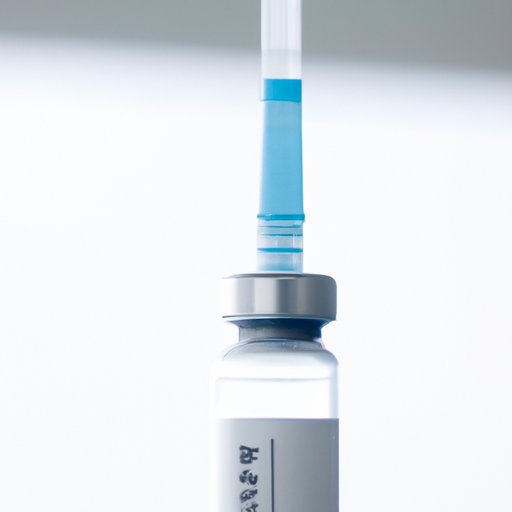
Introduction
Flu season can be a scary time, with many people trying to protect themselves from getting sick. One common preventative measure is getting the flu vaccine. However, even with vaccination, it’s still possible to get the flu. In this article, we’ll explore whether or not it’s possible to still get the flu after being vaccinated and explain why getting vaccinated is still crucial for your health and the health of those around you.
The Flu Shot Doesn’t Guarantee Immunity: Here’s What You Need to Know
It’s a common misconception that getting a flu shot guarantees you won’t get sick with the flu. Unfortunately, that’s not the case. The flu vaccine is designed to reduce the risk of infection, but it isn’t foolproof. There are many factors that can affect the effectiveness of the vaccine, including the strains of the flu virus that are circulating each year. Sometimes, the strains that are included in the vaccine don’t match the ones that end up causing the most illness.
The Importance of a Flu Shot, Even if You Still Get Sick
Even if you do end up getting the flu after having a flu shot, it’s still important to get vaccinated. The vaccine can help reduce the severity of your illness, prevent complications, and protect those around you. For example, people with weakened immune systems, such as the elderly or people with chronic illnesses, may not be able to get vaccinated themselves. By getting vaccinated, you’re helping protect them from getting sick.
According to the Centers for Disease Control and Prevention (CDC), flu vaccination prevented an estimated 7.5 million flu illnesses and 105,000 flu-related hospitalizations during the 2019-2020 flu season alone. Getting vaccinated is an important part of protecting yourself and others, even if it doesn’t guarantee you won’t get sick.
Debunking Myth: The Truth About Getting Sick After The Flu Shot
One common myth about the flu vaccine is that it can actually give you the flu. This is not true. The flu vaccine contains either inactivated flu viruses that can’t cause illness or weakened viruses that are less likely to cause illness. It’s possible to experience some mild side effects from the flu vaccine, such as soreness at the injection site or a low-grade fever, but these symptoms are not the same as having the flu.
It’s important to note that there are different types of vaccines available, including the nasal spray vaccine, which contains a weakened live virus. However, even this type of vaccine is highly unlikely to cause illness. The CDC states that the nasal spray vaccine should not be used during the 2020-2021 flu season due to concerns about its effectiveness.
What To Do If You Get Sick After Getting The Flu Shot
If you do get the flu after getting vaccinated, it’s important to take care of yourself. Get plenty of rest, stay hydrated, and consider taking over-the-counter medications to help relieve your symptoms. If your symptoms are severe or you’re at a higher risk for complications from the flu, such as if you’re pregnant or have a chronic medical condition, speak with your healthcare provider. In some cases, antiviral medications may be prescribed to help reduce the severity and duration of your illness.
If you experience any concerning symptoms after getting vaccinated, such as difficulty breathing, chest pain, or severe swelling at the injection site, seek immediate medical attention.
Why Herd Immunity Is More Important Than Ever
One of the key reasons to get vaccinated, even if you still get sick, is to help protect those around you through herd immunity. Herd immunity occurs when a high percentage of a population is immune to a specific virus, making it less likely for the virus to spread. This is especially important for people who are unable to get vaccinated themselves, such as infants, elderly individuals, pregnant women, and people with compromised immune systems.
The more people who get vaccinated, the stronger the herd immunity gets. This is why it’s essential for individuals to take responsibility for their health and the health of those around them. Even if you don’t feel that you’re at high risk for complications from the flu, getting vaccinated can make a significant difference in protecting the vulnerable members of your community.
The Future of Flu Shots: What You Can Expect in the Years to Come
Research is ongoing to develop new and more effective flu vaccines. This includes vaccines that can protect against multiple strains of the flu virus at once, as well as vaccines that use different methods of delivery, such as patches rather than injections.
It’s important to note that getting vaccinated each year is still necessary, as the flu virus is constantly evolving and changing. The strains that are prevalent one year may not be the same ones that are causing illness the next year. This is another reason why herd immunity is so crucial; the more people who get vaccinated each year, the less likely it is for new strains of the virus to emerge and spread.
Conclusion
While getting the flu vaccine doesn’t guarantee that you won’t get sick, it’s still an incredibly important step in protecting your health and the health of those around you. Even if you do end up getting sick, the vaccine can help reduce the severity of your symptoms and prevent complications. Remember, getting vaccinated is not just about protecting yourself; it’s also about contributing to herd immunity and protecting the most vulnerable members of your community.
Remember, if you’re feeling unwell after getting vaccinated, speak with your healthcare provider and take care of yourself.




